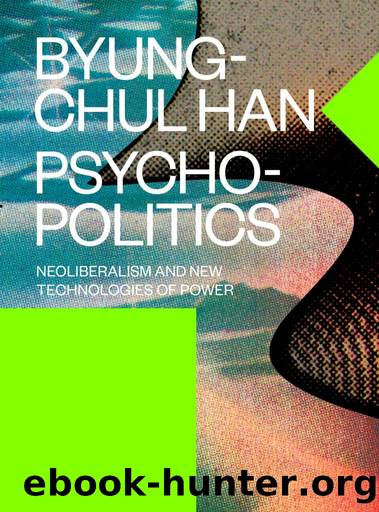Psychopolitics: Neoliberalism and New Technologies of Power by Byung-Chul Han

Author:Byung-Chul Han [Han, Byung-Chul]
Language: eng
Format: azw3
Tags: Politics, Philosophy, Psychology, Nonfiction
ISBN: 9781784785772
Publisher: Verso
Published: 2014-01-01T00:00:00+00:00
10.
Gamification
In order to heighten productivity, emotional capitalism also enlists playing and games â which should, in fact, be the Other of Work, its opposite. Emotional capitalism is gamifying the life- and working world. Playing games lends an emotional, indeed a dramatic, charge to working â which in turn generates more motivation. Because games rapidly deliver a sense of success and reward, the result is higher performance and a greater yield. A person playing a game, being emotionally invested, is much more engaged than a worker who acts rationally or is simply functioning.
Games exhibit a specific temporality marked by immediate experiences of success and reward. But what matures over time cannot be gamified. Whatever is long, anything that lasts a long time, proves incompatible with the gameâs temporality. Hunting, for instance, matches the mode of the game, whereas farming, which depends on slow processes of ripening and quiet growth, cannot be gamified at all. Life cannot be turned into hunting alone.
The gamification of work exploits homo ludens. The player subjugates him- or herself to the order of domination in the very act of playing. Today, the gamification logic of âLikesâ, âFriendsâ and âFollowersâ means that social communication is also being plugged into and subordinated to a game mode. The corollary of the gamification of communication is its commercialization. That said, this process is destroying human communication.
âA corpse is running society â the corpse of labourâ (Ein Leichnam beherrscht die Gesellschaft â der Leichnam der Arbeit). So begins the Manifesto against Labour, written by the Krisis-Group, which is based around Robert Kurz.1 Following the microelectronic revolution, the argument goes, the production of wealth has grown increasingly detached from human labour. Yet at the same time, society has never been so thoroughly committed to work as it is in our post-Fordist age â an epoch that, in actual fact, is only making labour more and more superfluous. The manifesto points out that the political Left, in particular, has exalted labour. Not only has it declared work the essence of human being; more still, it has mystified labour and pronounced it the opposite principle to capital. The Left does not view work itself as a scandal â only its exploitation. For this reason, the manifesto concludes, the programme of all workersâ parties has always been simply the liberation of labour, instead of liberation from labour. Labour and Capital, then, represent two sides of the same coin.
Yet despite highly vigorous forces of production, we have not witnessed the advent of the ârealm of freedomâ (Reich der Freiheit) where âlabour determined by necessity and external expediency endsâ.2 Ultimately, Marx himself adhered to the primacy of labour: the âincrease of free timeâ, he contends, âreacts back upon the power of labour as itself the greatest productive powerâ.3 But with that, the realm of necessity comes to colonize the realm of freedom. âIdle timeâ as âtime for higher activityâ transforms its possessor âinto a different subjectâ with greater productive force than one who merely toils. As âtime for
Download
This site does not store any files on its server. We only index and link to content provided by other sites. Please contact the content providers to delete copyright contents if any and email us, we'll remove relevant links or contents immediately.
Should I Stay or Should I Go? by Ramani Durvasula(6785)
Why We Sleep: Unlocking the Power of Sleep and Dreams by Matthew Walker(5642)
Fear by Osho(4085)
Flow by Mihaly Csikszentmihalyi(4052)
Rising Strong by Brene Brown(3781)
Why We Sleep by Matthew Walker(3773)
Too Much and Not the Mood by Durga Chew-Bose(3694)
How to Change Your Mind by Michael Pollan(3679)
The Hacking of the American Mind by Robert H. Lustig(3580)
Lost Connections by Johann Hari(3455)
He's Just Not That Into You by Greg Behrendt & Liz Tuccillo(3303)
Evolve Your Brain by Joe Dispenza(3051)
What If This Were Enough? by Heather Havrilesky(2945)
Resisting Happiness by Matthew Kelly(2887)
Crazy Is My Superpower by A.J. Mendez Brooks(2860)
The Courage to Be Disliked by Ichiro Kishimi & Fumitake Koga(2797)
The Book of Human Emotions by Tiffany Watt Smith(2771)
Descartes' Error by Antonio Damasio(2731)
In Cold Blood by Truman Capote(2685)
